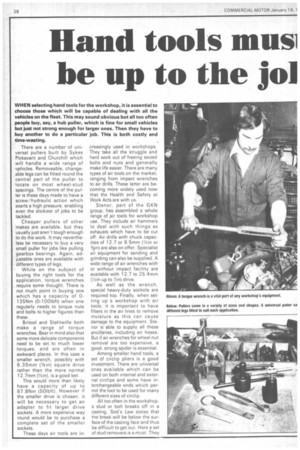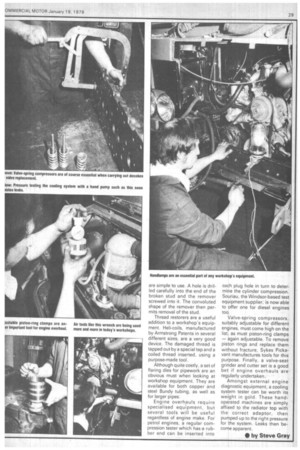Hand tools musi be up to the joi
Page 30

Page 31

If you've noticed an error in this article please click here to report it so we can fix it.
WHEN selecting hand tools for the workshop, it is essential to choose those which will be capable of dealing with all the vehicles on the fleet. This may sound obvious but all too often people buy, say, a hub puller, which is fine for small vehicles but just not strong enough for larger ones. Then they have to buy another to do a particular job. This is both costly and time-wasting.
There are a number of universal pullers built by Sykes Pickavant and Churchill which will handle a wide range of v,ehicles. Removeable, changeable legs can be fitted round the central part of the puller to locate on most wheel-stud spacings. The centre of the puller is these days made to have a screw/hydraulic action which exerts a high pressure, enabling even the stickiest of jobs to be tackled.
Cheaper pullers of other makes are available, but they usually just aren't tough enough to do the work. It may nevertheless be necessary to buy a very small puller for jobs like pulling gearbox bearings. Again, adjustable ones are available with different types of legs.
While on the subject of buying the right tools for the application, torque wrenches require some thought. There is not much point in buying one which has a capacity of 0135Nm (0-100Ibft) when one regularly needs to torque nuts and bolts to higher figures than these.
Britool and Stahlwille both make a range of torque wrenches. Bear in mind also that some more delicate components need to be set to much lower torques, and are often in awkward places. In this case a smaller wrench, possibly with 6.35mm (1/41n) square drive rather than the more normal 12.7mm (1/2in), is a good bet.
This would more than likely have a capacity of up to 67,8Nm (501bff), However if the smaller drive is chosen, it will be necessary to get an
adapter to fit larger drive sockets. A more expensive way.
round would be to purchase a complete set of the smaller sockets.
These days air tools are in creasingly used in workshops. They take all the struggle and hard work out of freeing seized bolts and nuts and generally make life easier. There are many types of air tools on the market, ranging from impact wrenches to air drills. These latter are becoming more widely used now that the Health and Safety at Work Acts.are with us.
Stenor, part of the GKN group, has assembled a whole range of ,air tools for workshop use. They include air hammers to deal with such things as exhausts which have to be cut off. Air drills with chuck capacities of 12.7 or 9.5mm (1/2in or 3/4in) are also on offer. Specialist air equipment for sanding and grinding canalso be supplied. A wide range of air wrenches with or without impact facility are available with 12.7 to 25.4mm (1/2in up to lin) drive.
As well as the wrench, special heavy-duty sockets are required too. Finally, when setting up a workshop with air tools, it is important to have filters in the air lines to remove moisture as this can cause damage to the equipment. Stenor is able to supply all these ancillaries, including air hoses. But if air wrenches for wheel nut removal are too expensive, a good, strong spider is essential.
Among smaller hand tools, a set of circlip pliers is a good investment. There are universal ones available which can be used on both internal and external circlips and some have interchangeable ends which permit the tool to be used for many different sizes of circlip.
Al! too often in the workshop, a stud or bolt breaks off in a casting. Sod's Law states that the break will be below the surface of the casting face and thus be difficult to get out. Here a set of stud removers is a must. They are simple to use. A hole is drilled carefully into the end of the broken stud and the remover screwed into it. The convoluted shape of the remover then permits removal of the stud.
Thread restorers are a useful addition to a workshop's equipment. Heli-coils, manufactured by Armstrong Patents in several different sizes, are a very good device. The damaged thread is tapped out by a special tap and a coiled thread inserted, using a purpose-made tool.
Although quite costly, a set of flaring dies for pipework are an obvious must when looking at workshop equipment. They are available for both copper and steel Bundy tubing, as well as for larger pipes.
Engine overhauls require specialised equipment, but several tools will be useful regardless of engine make. For petrol engines, a regular compression tester which has a rubber end can be inserted into each plug hole in turn to determine the cylinder compression. Sounau, the Windsor-based test equipment supplier, is now able to offer one for diesel engines too.
Valve-spring compressors, suitably adjustable for different engines, must come high on the list, as must piston-ring clamps — again adjustable. To remove piston rings and replace them without fracture, Sykes Pickavent manufactures tools for this purpose. Finally, a valve-seat grinder and cutter set is a good bet if engine overhauls are regularly undertaken.
Amongst external engine diagnostic equipment, a cooling system tester can be worth its weight in gold. These handoperated machines are simply affixed to the radiator top with the correct adaptor, then pumped up to the right pressure for the system. Leaks then become apparent.
• by Steve Gray




































































































